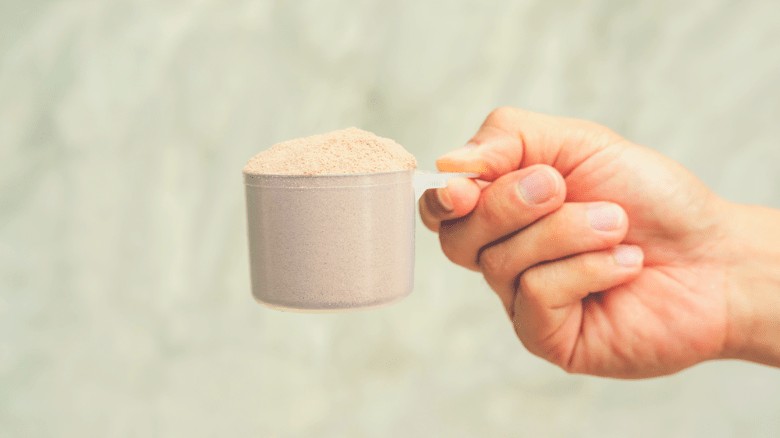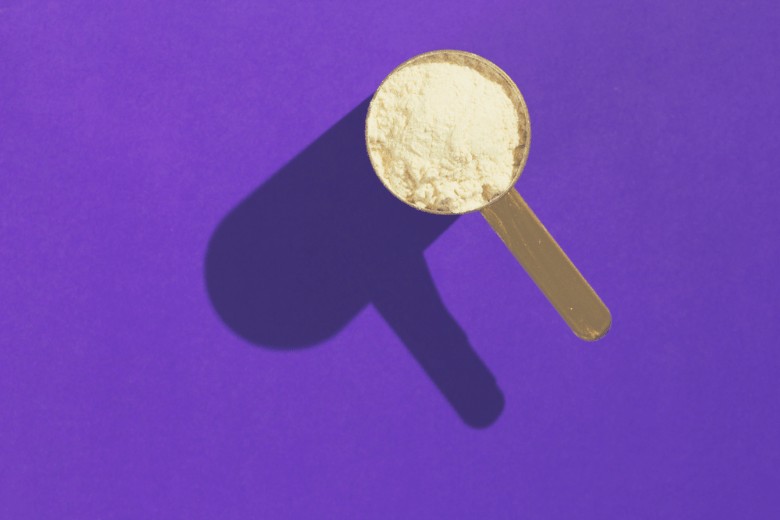Has your fitness plateau lead you to questions which is better, rice protein vs. whey?
We’ve maxed out our routines; we’ve hit all the benchmarks we set for ourselves, and we’re left wondering what to do next.
Some people consider hiring personal trainers to help them reach that next level.
I, myself, decided to give supplements a try first, but I didn’t really know which powder would be best for me when it came to rice protein vs. whey protein.
It took some time and some switching back and forth, but I finally found the one that worked for me. If you’re here looking for answers, I’ll help as much as I can.
Rice Protein vs. Whey: The Basics
Both rice protein and whey protein supplements have become very popular over the last several years.
You can ask a dozen fitness nuts which they prefer, and you’ll probably get about half of them answering, “Rice protein, of course!” and the other half answering, “Whey! There’s no question about it!”
One of the biggest reasons people tend to choose one of these over the other is because of the actual ingredients or to be more precise, the actual food from which each one is derived.
Rice Protein
If you guessed that rice protein comes from rice, you’re exactly right. More specifically, it comes from brown rice.
A lot of people don’t like the idea of a protein powder that’s made from rice, which is well-known as a carbohydrate, but brown rice actually does contain a significant amount of protein.
According to an article in Medical News Today comparing brown and white rice, 202 grams of brown rice has over five grams of protein in it, as well as several vitamins and minerals that are essential for a healthy body.
If you’re consuming rice protein, what you’re actually getting is the protein that’s been extracted from the brown rice and turned into protein powder.
You mix it in with your water, your shake or whatever else you drink it with, and it becomes an easily digested source of concentrated protein.
Whey
Whey, on the other hand, is a dairy-based supplement. Whey is created during the process that turns milk into cheese, yogurt or other dairy products.
Simply put, whey comes from milk, and whey supplements contain the protein extracted from whey and turned into protein powder in a process that’s very similar to the one used to create rice protein.
There are two main types of whey protein supplements: concentrate and isolate. Like rice protein, both are easily digested.
Whey Protein: Concentrate vs. Isolate
The main differences between whey concentrate and whey isolate are the processes by which they’re made and the nutritional value of each.
For our purposes, the process by which each is made is largely unimportant.
The important part is that concentrate has about 80% protein by weight while isolate has about 90% (or more) protein by weight.
Isolate also has fewer carbohydrates and less lactose.
In theory, all of that would make isolate the better choice, at least in terms of whey protein.
However, concentrate is generally cheaper, and consuming a larger amount of concentrate can give you just as much protein as consuming a smaller amount of isolate.
Considering the sometimes significant price difference between the two, concentrate is sometimes more efficient in the long run.
Rice Protein vs. Whey: The Nutritional Facts
As I’ve already mentioned, the foods from which the protein supplements are derived plays a huge part in whether or not someone chooses to use one over the other.
For example, if someone is lactose intolerant, that person might choose rice protein over whey protein because there’s no dairy in rice protein.
On the other hand, if someone is extremely sensitive to carbohydrates, that person might choose whey protein instead.
The nutrition facts of the two supplements can also determine which supplement you choose to use.
This is the breakdown of rice protein:
- 25-30 gram serving:
- Protein – 27 grams
- Calories – 117
- Carbohydrates – 2
- Fat – 0
Here is the breakdown of whey protein:
- 25-30 gram serving:
- Protein – 26 grams
- Calories – 109
- Carbohydrates – 1
- Fat – 0
Those differences may not look like much, and in single servings, they aren’t. However, as a fitness nut yourself, you know that a single serving doesn’t always do the trick.
Furthermore, depending on how strict your diet is, those extra calories and extra carbs in rice powder might be problematic.
If your diet isn’t as strict, you might not mind the extra carbs and calories, especially in exchange for the extra grams of protein.
Where rice protein falls short, though, is in the amino acid department. Whey protein is what’s known as a “complete protein.”
A complete protein is a protein that provides you with all nine of the essential amino acids.
Essential amino acids are amino acids that the body must have to function properly, but the body can’t produce them on its own. It has to get them from food, drinks and/or supplements.
Rice protein is not a complete protein; whey protein, because it comes from dairy, is a complete protein.
However, if you can’t do dairy, you aren’t going to be forced to live a life never getting enough essential amino acids.
It just means you need to eat extra meats that contain complete proteins. The other option is to combine rice protein with another type of protein such as hemp or soy protein.
If you take these together, you can get all nine of the essential amino acids you need.

Rice Protein vs. Whey: The Benefits and Disadvantages
Despite which supplement you’re using, the benefits of both are largely the same. On a general scale, taking these types of supplements can enhance your overall exercise performance.
It can also lead to noticeable improvements in your physique.
Most of these benefits are due strictly to the added protein in your diet, which means that you could, in theory, gain these same benefits without supplements if you’d simply incorporate enough protein into your daily diet.
However, because lots of protein-rich foods are fatty and have tons of calories, doing so could also cause problems in other areas, not to mention, drinking protein powder in shakes is just so much more convenient.
More specifically, though, here are some of the benefits you can get from regularly using either one of these powders.
Larger Muscles
Proteins are the building blocks of muscle. That’s one of those things you learn when you’re still a kid in health or biology class.
If you’re trying to build larger, bulkier muscle, your body absolutely has to have amino acids, and protein is full of amino acids.
As you work out, you damage your muscles by causing tiny little tears in them.
The amino acids in proteins rush to those tears and repair them; if you’ve consumed enough protein that there are amino acids left over after they’ve repaired these tears, the remaining amino acids will turn into bulkier muscle.
Supplementing your protein intake with protein powder can help ensure you get enough protein for this process.
Post-Workout Recovery
I just touched a little on how protein aids in post-workout recovery. It repairs your muscles. However, that’s not the only thing it does.
The more protein you consume, the more likely it is that you’ll stimulate a process in your body known as protein synthesis.
Not only is this process key to building muscle, it’s also important in helping you recover in general.
Consuming enough protein through food and supplements can make you feel less fatigued after a workout; it can cut down on the amount of aches and pains you experience as well.
It reduces muscle damage and helps cut down on muscle loss during your periods of inactivity.
Managing Your Weight
Protein can also be instrumental in helping you maintain or even lose weight. Carbs do a lot of good things for your body, and I’d never advocate for a keto-style or extreme low-carb diet.
Your body needs carbs to function properly.
However, there is some truth to the statement that consuming carbs will have you feeling hungry again in no time because they aren’t filling.
Protein, on the other hand, is very filling. It’s the reason you feel so satisfied and full even several hours after eating a big steak, whereas, if you go to a restaurant and fill up on the free rolls, you’ll be hungry again in just a couple of hours.
When you eat enough protein or take protein supplements, you keep a general feeling of satisfaction and fullness.
This leads to smaller portion sizes and balanced meals. It can also help you cut down on your instances of between-meals snacking.
Getting your protein through these supplements as opposed to eating is even more likely to help you lose weight because you’re not getting the large intake of calories you’d be getting if you try to consume 80 grams of protein a day through food alone.

Cuts Down on Diseases/Ailments
Consuming an adequate amount of protein can also help in other areas as well.
Studies have shown over and over again that getting enough protein, especially protein that comes from supplements, plants, nuts and fiber, can help lower cholesterol and reduce the risk of high blood pressure.
In fact, as long as you’re consuming the right type of protein – low-fat, low-calorie protein – you can actually reduce your risk of cardiovascular disease.
Just an FYI: This means protein that comes from lean meats, plants, supplements and nuts, not protein that comes from fatty foods like bacon, sausage, steak and bologna.
Sorry guys, those fatty meats still aren’t all that great for you.
Final Thoughts: Rice Protein vs. Whey – Which Is Best?
Really, when it comes to rice protein vs. whey protein, you’ll have to read up on all the pertinent information and decide for yourself which is best for you.
If you’re lactose intolerant or following a vegan diet, the choice is already made for you. You’ll have to go with rice protein.
However, if you have no dietary restrictions that keep you from choosing either of the options, you’ll just need to look at all the different aspects of both and decide which is best for you.
I, personally, prefer whey protein.
I like the ease and convenience of taking only one supplement in order to get all nine of my essential amino acids.
I also think the whey protein tastes better, although I’ve been told multiple times that they both taste exactly the same and that I’m totally making that up.
Maybe that’s true; maybe it’s all in my head.
However, I’ve tried multiple brands of both, and I’ve never found a rice protein brand I enjoyed more than the whey protein brands I use regularly.
In the end, though, it’s entirely up to you to decide which is the better fit for you.
They’re both really great supplements, and aside from the essential amino acids, they both provide largely the same benefits.
As far as price is concerned, they’re both pretty comparable. Protein powders fluctuate in price anyway, with some being relatively inexpensive and others being outrageous.
That’s more of a brand vs. brand thing as opposed to a rice protein vs. whey protein thing.
If you’re totally new to supplements, I recommend you try one for a month. Then, switch over and try the other for a month.
See which one gives you the best results. That’s really the only real way to tell which one is going to be right for you.
If you’re looking for a rice protein that absorbs 30% faster than whey, we recommend this one.



